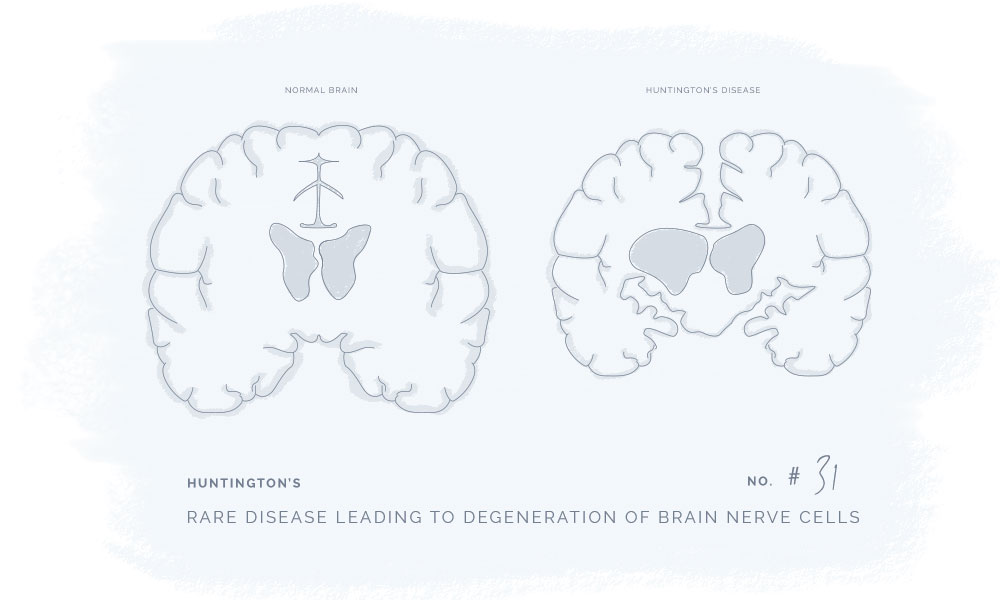huntington's disease
Category
Genetic
REVIEWED BY
Our Biomedical Scientist
Reviewed based on
Literature Discussion & Clinical Trials
Last update
October 2020

What is Huntington's Disease
Huntington’s disease is a progressive-, severe-, rare-, fatal- and hereditary disease that causes degeneration of nerve cells in the brain. The disease interferes with most aspects of life as it impacts functional abilities such as movement and cognitive processes as well as it may lead to the development of psychiatric disorders.1
Symptoms
The symptoms vary greatly from individual to individual. However, the symptoms can be divided into three groups: movement, cognition, psychiatric disorders.1
Movement
Huntington’s disease may interfere with both involuntary and voluntary movements
- Involuntary jerking or twisting (chorea)
- Muscle contracture and rigidity (dystonia)
- Difficulty speaking
- Difficulty swallowing
- Abnormal or slow eye movements
- Impaired balance, posture, and gait
Cognition
- Impaired concentration e.g. difficulty focusing, prioritizing, and organizing
- Impaired judgment of own abilities and behavior
- Slow processing of thoughts
- Lack of impulse control
Psychiatric disorders
- Obsessive-compulsive disorder
- Mania
- Bipolar disorder
Cause
Huntington’s disease is caused by a defect in a single gene inherited from the parents (i.e. a child inherits one gene from each parent in every gene pair). As Huntington’s disease is an autosomal dominant disorder, the defect has to be only one of the genes from the parents to be present. This means that a parent with the disease in one gene has a 50% chance of giving it further to their child. The gene defect leads to the degeneration of nerve cells in the brain and when the disease emerges, it can lead to death within 10-30 years.1
The connection between Cannabinoids & Huntington's Disease
Studies find that CBD and THC may have great therapeutic potential and may be used to help treat Psoriasis. CBD and THC are well-known cannabinoids, however, they do not have the same psychoactive effects. THC is psychoactive while CBD does not possess psychoactive effects. According to WHO guidelines, the cannabidiol CBD is generally well tolerated with a good safety profile.
Preclinical data proposes that the cannabinoids THC, CBD, and CBG have potential in the treatment of Huntington’s disease as the endocannabinoid system is involved. Specifically, THC may have great therapeutic potential.2
Recent studies have also proposed that cannabinoids may relieve movement symptoms caused by the disease.3
The literature discussion is an overview of the published results from scientific studies investigating if and how cannabinoids can be beneficial in the treatment of Huntington’s Disease. The overview will be updated regularly to ensure the newest and most accurate information.
The ECS may be involvement in Huntington’s disease
The endocannabinoid system is involved in the pathophysiology of Huntington’s Disease.4,5,
Consistent changes in CB1 , PPARa ‘] PPARa [/simple_tooltip], and NAPE-PLD were observed in a meta-analysis involving patients and animal models of Huntington’s Disease.6 This suggests the involvement of the endocannabinoid system in Huntington’s Disease.
Targeting CB2 may be beneficial in treatment
In mice, motor deficits, synapse loss, and central nervous system inflammation can be inhibited upon treatment with a CB2 receptor antagonist, whereas these effects can be blocked by a CB2 receptor antagonist. These findings confirm that CB2 receptor signaling is associated with Huntington’s Disease.7
In a mouse model for Huntington’s (3NP), CBG exhibited neuroprotective activities and ameliorated motor deficits.8
Clinical trials are research studies that examine new treatments and evaluate their effects on human health outcomes.
THC may be beneficial in treatment
In a double-blind, placebo-controlled, cross-over study it was observed that nabilone (a synthetic variant of THC) ameliorated motor function and reduced cognitive decline in Huntington’s patients.9
- https://www.mayoclinic.org/diseases-conditions/huntingtons-disease/symptoms-causes/syc-20356117
- https://ghmedical.com/endocannabinoid-system/diseases/huntingtons
literature - Saft, C., (2018). “Cannabinoids for Treatment of Dystonia in Huntington’s Disease”. https://pubmed.ncbi.nlm.nih.gov/29562549/
- Fernández-Ruiz, J., Et al., (2015). ”Endocannabinoids and Neurodegenerative Disorders: Parkinson’s Disease, Huntington’s Chorea, Alzheimer’s Disease, and Others. En R. G. Pertwee (Ed.), endocannabinoids (pp. 233-259). https://doi.org/10.1007/978-3-319-20825-1_8
- Pazos, M.R., Et al., (2008). ”The endocannabinoid system in Huntington’s disease. Current Pharmaceutical Design. https://pubmed.ncbi.nlm.nih.gov/18781982/
- Laprairie, R.B., Et al., 2015). Components of the endocannabinoid and dopamine systems are dysregulated in Huntington’s disease: analysis of publicly available microarray datasets. https://doi.org/10.1002/prp2.104
- Bouchard, J., Et al., (2012). “Cannabinoid receptor 2 signaling in peripheral immune cells modulates disease onset and severity in mouse models of Huntington’s disease”. https://doi.org/10.1523/JNEUROSCI.4008-12.2012
- Valdeolivas, S., Et al., (2015). Neuroprotective properties of cannabigerol in Huntington’s disease: studies in R6/2 mice and 3-nitropropionate-lesioned mice. Neurotherapeutics: 185-199. https://doi.org/10.1007/s13311-014-0304-z
clinical - Curtis, M., Et al., (2009). A pilot study using nabilone for symptomatic treatment in Huntington’s disease. Mov. Disord. Off. J. Mov. Disord. Soc. 24, 2254–2259. https://pubmed.ncbi.nlm.nih.gov/19845035/
CANNABINOIDS & RECEPTORS
Below you find the plant cannabinoids, cannabinoid receptors, and endocannabinoids that are associated with the potential therapy.
If you have any further information relevant to the connection between Huntington’s Disease and cannabinoids or find any of the information inaccurate, outdated or incomplete please contact us here.

